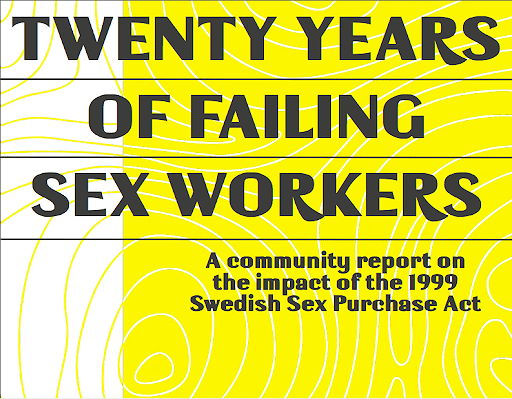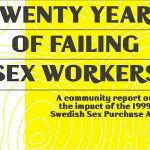September 29/30, 2019
Twenty years after Sweden passed the Sex Purchase Act of 1999, the country hosted “Sex Work, Human Rights, and Health: Assessing 20 Years of the Swedish Model” in Stockholm. The conference brought together activists, researchers, and policymakers from around the world to discuss the impact of the 1999 law, which criminalized the purchase of sex (arresting clients) while permitting the sale of sex (not arresting sex workers).
According to a report released by the organizers of the conference, Sweden’s law has “contributed to [the] increasing stigmatization and vulnerability of women, and people of all genders, contradicting the proclaimed feminist-humanitarian principles of the lawmakers.”
Fuckforbundet, a sex-worker rights organization founded by and for sex workers, organized the conference and published the report “Twenty Years of Failing Sex Workers: A community report on the impact of the 1999 Swedish Sex Purchase Act.”
The report explains how sex workers’ living and working conditions have deteriorated since 1999 because of the Swedish government’s “widespread systematic attempts to eradicate the sex industry.” Rather than empowering women, the Swedish model increases the stigmatization and vulnerability of workers in a criminalized industry. This criminalization is particularly dangerous for immigrants and women of color.
Before the conference concluded, hundreds of activists marched through Stockholm’s streets to demand that the Swedish government protect sex workers. Protesters explained to reporters from PinkNews UK that criminalizing clients contributes to the stigmatization of those in the sex industry.
Notably, the Swedish government has yet to a systematic evaluation of the law. Despite this lack of research, the policy has spread to other countries, including Norway, Iceland, Finland, Canada, and Northern Ireland.
In 2014, a study commissioned by the Norwegian government concluded that sex workers in Norway today suffer from diminished bargaining power and increased safety concerns, instead relying more on abusive third parties.†
The results from Norway prompted Amnesty International to conduct its 2016 study of sex-worker rights, which recommended the full decriminalization of sex work in order to “respect, protect, and fulfill the human rights of sex workers.” These findings have been backed up by scholars of multiple disciplines, whose work can be found on the “resources” page of DSW’s web site.
†Bjørndahl, U. (2012). Dangerous Liaisons. A report on the violence women in prostitution in Oslo are exposed to.

Marchers carry red umbrellas, the international symbol of sex workers’ rights, at the Stockholm demonstration. (Photo: Twitter/SWARM)

The sex workers’ rights movement wants sex work decriminalized globally. (Photo: Twitter/SWARM)

The cover page of the report by Fuckforbundet
DSW Newsletter #7 (October 2019)
Twenty Years Later, Data Show That the Swedish Model Harms Sex Workers

NY Should Allow Trafficking Survivors To Clear Criminal Records

DSW Joins Community Organizers at a Trans/Sex Workers Rights Mixer

“End Demand” Doesn’t Work in Ireland

DSW in the News

 Twenty Years Later, Data Show That...
Twenty Years Later, Data Show That...
 NY Should Allow Trafficking Survivors To...
NY Should Allow Trafficking Survivors To...
 DSW Joins Community Organizers at a...
DSW Joins Community Organizers at a...
 “End Demand” Doesn’t Work in Ireland
“End Demand” Doesn’t Work in Ireland
 DSW in the News
DSW in the News
